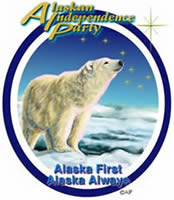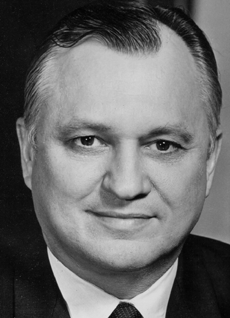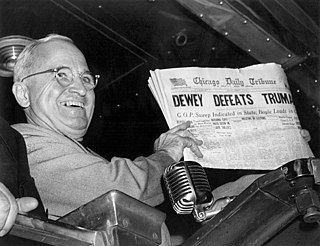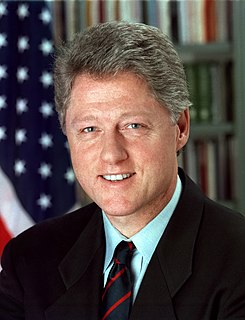
The 2004 Washington gubernatorial election on November 2, 2004 gained national attention for its legal twists and extremely close finish. In what was notable for being among the closest political races in United States election history, Republican Dino Rossi was declared the winner in the initial automated count and again in the subsequent automated recount. It wasn't until after the third count, a second recount done by hand, that Christine Gregoire, a Democrat, took the lead by a margin of 129 votes.

The Alaskan Independence Party (AKIP) is a political party and independence movement in the U.S. state of Alaska that advocates an in-state referendum which includes the option of Alaska becoming an independent country. The party also advocates positions similar to those of the Constitution Party, Republican Party and Libertarian Party, supporting gun rights, privatization, home schooling, and limited government.

Walter Joseph "Wally" Hickel was an American businessman, real estate developer, and politician. Starting out in Alaska during territorial days as a construction worker and subsequently a construction company owner/operator, he later became heavily involved with real estate development during Alaska's post-World War II boom period, building residential subdivisions at first, then branching out to building and operating shopping centers and hotels. Thrust into politics during the early 1950s by a power struggle within the territorial Republican Party and the battle to achieve statehood for Alaska, Hickel remained a formidable power in Alaskan politics for nearly a half century.

The 2006 Alaska gubernatorial general election took place on November 7, 2006. The former mayor of Wasilla, Sarah Palin, was elected governor.
Eric Chancy Croft is an American lawyer and current member of the Anchorage Assembly, representing Anchorage's West district. From 1997 to 2006, Croft served five terms as the Alaska State Representative for District 15, representing Spenard, Anchorage. He was also a candidate in the August 2006 Democratic gubernatorial primary election in Alaska. He received 23.1% of the vote, losing to 68.6% achieved by former governor Tony Knowles (D). Croft served as Anchorage's school board president from 2013 to 2016. In April 2016 he was elected to the Anchorage Assembly, replacing Ernie Hall, who decided not to run for reelection.
The Alaska Democratic Party is the affiliate branch of the United States Democratic Party in the state of Alaska, headquartered in Anchorage.

The 1998 Alaska gubernatorial general election took place on November 3, 1998. The election resulted in a landslide for the Democratic incumbent, Tony Knowles, who had won the 1994 gubernatorial election by only 536 votes. Knowles was the first incumbent governor to attain re-election since 1978. As of 2019, this is the most recent election in which a Democrat was elected Governor of Alaska and the most recent election in which an Alaskan governor was re-elected.

The 2008 United States Senate election in Alaska was held on November 4, 2008. Incumbent Republican U.S. Senator and former President pro tempore Ted Stevens ran for re-election to a seventh term in the United States Senate. It was one of the ten Senate races that U.S. Senator John Ensign of Nevada, the chairman of the National Republican Senatorial Committee, predicted as being most competitive. The primaries were held on August 26, 2008. Stevens was challenged by Democratic candidate Mark Begich, the mayor of Anchorage and son of former U.S. Representative Nick Begich.

The 1994 United States gubernatorial elections were held on November 8, 1994 in 36 states and two territories. Many seats held by Democratic governors switched to the Republicans during the time known as the Republican Revolution.

The 2008 congressional election in Alaska was held on November 4, 2008 to determine who will represent the state of Alaska in the United States House of Representatives. Alaska has one seat in the House, apportioned according to the 2000 United States Census. Representatives are elected for two-year terms; whoever is elected will serve in the 111th Congress from January 4, 2009 until January 3, 2011. The election coincides with the 2008 U.S. presidential election. The primary election was held August 26, 2008.
Political party strength in Alaska has varied over the years. The communities of Juneau, Sitka, downtown and midtown Anchorage, the areas surrounding the College/University of Alaska Fairbanks campus and Ester and the "Alaska Bush" – rural, sparsely populated Alaska – stand out as Democratic strongholds, while the Kenai Peninsula, Matanuska-Susitna Valley, parts of Anchorage, and Fairbanks, Ketchikan, Wrangell, and Petersburg serve as the Republican Party electoral base. As of 2004, well over half of all registered voters have chosen "Non-Partisan" or "Undeclared" as their affiliation, despite recent attempts to close primaries.

The 2002 Alaska gubernatorial election took place on November 5, 2002 for the post of Governor of Alaska. Republican U.S. Senator Frank Murkowski defeated Democratic Lieutenant Governor Fran Ulmer. Murkowski became the first Republican elected governor of Alaska since Jay Hammond in 1978.

The 2004 United States Senate election in Alaska took place on November 2, 2004, alongside other elections to the United States Senate in other states as well as elections to the United States House of Representatives, various state and local elections, and the presidential election of that year. Incumbent Republican U.S. Senator Lisa Murkowski of Anchorage, sought election to her first full term after being appointed to serve out the rest of her father's unexpired term when he resigned in December 2002 to become Governor of Alaska. Her main challenger was Democratic former governor Tony Knowles, her father's predecessor as governor. Murkowski won by a slight margin.

The 2010 United States Senate election in Alaska took place on November 2, 2010, alongside 33 other U.S. Senate elections in other states, as well as elections in all states for Representatives to the U.S. House, and various state and local offices.

The 1990 Alaska gubernatorial election took place on November 6, 1990, for the open seat of Governor of Alaska. In 1989, incumbent Governor Steve Cowper, a Democrat, had announced that he would not seek re-election for a second term.

Bob Poe is an American businessman and former cabinet member who ran for Governor of Alaska in the 2010 Alaska gubernatorial election. Poe announced his candidacy in January 2009 and was the first Democrat to announce his intention to run for governor. He has worked with various administrations in Alaska under former Governors Bill Sheffield, Steve Cowper, Tony Knowles, and Wally Hickel. On June 14, 2010 he announced that he was withdrawing from the gubernatorial race.

The 2014 United States Senate election in Alaska took place on November 4, 2014, to elect a member of the United States Senate to represent the State of Alaska, concurrently with the election of the governor of Alaska, as well as other elections to the United States Senate in other states and elections to the United States House of Representatives and various state and local elections.

The 2014 Alaska gubernatorial election took place on November 4, 2014, to elect the governor and lieutenant governor of Alaska, concurrently with the election of Alaska's Class II U.S. Senate seat, as well as other elections to the United States Senate in other states and elections to the United States House of Representatives and various state and local elections.

The 2018 Alaska gubernatorial election took place on November 6, 2018, to elect the governor and lieutenant governor of Alaska. In the primaries for recognized political parties, candidates for governor and lieutenant governor run separately. The winners of each respective primary for governor and lieutenant governor then become a joint ticket in the general election for their political party.
























